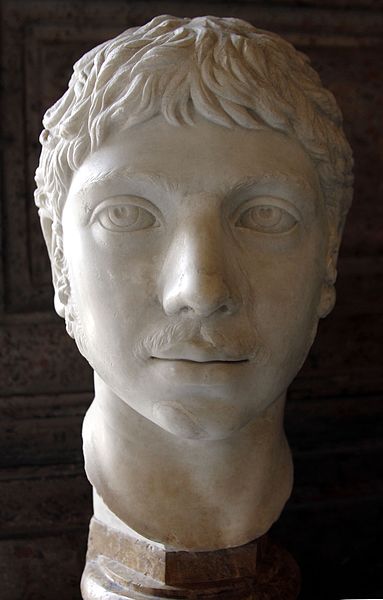I guess it was inevitable that the urge to “queer” the museum or “queer” history would eventually dig up Elagabalus as an icon, as his brief reign certainly drew a lot of slander in the years that followed his death (similar to what historians wrote about Caligula or Nero … once they were safely dead):

Bust of Elagabalus in the Palazzo Nuovo – Capitoline Museums – Rome.
Photo by José Luiz Bernardes Ribeiro / CC BY-SA 4.0.
It’s not such a stretch as it may sound. As well as throwing wild parties, Elagabalus was also said to have openly flouted contemporary gender roles. The emperor is said to have also dressed as a female sex worker, “married” a male slave and acted as his “wife”, asked to be referred to as “lady” rather than “lord” and even, according to one account, begged to have a surgical vagina made by a physician.
The stories led Keith Hoskins, executive member for arts at North Herts council, to say in a statement: “Elagabalus most definitely preferred the she pronoun, and as such this is something we reflect when discussing her in contemporary times … It is only polite and respectful. We know that Elagabalus identified as a woman and was explicit about which pronouns to use, which shows that pronouns are not a new thing.”
But do we know that? Thanks to a growing awareness of more complex ideas of gender in history, and a desire to reject historical prejudices, Elagabalus has been reclaimed in recent decades as a genderqueer icon.
However, many historians disagree that the evidence is as unambiguous as the museum says. Mary Beard, formerly professor of classics at Cambridge University, directed followers on X to her latest book, titled Emperor of Rome, which opens with a lengthy discussion of the “tall stories” told about Elagabalus.
The accounts of sexual unconventionality (and extravagant cruelty) largely originate with hostile historians who wanted to win the favour of Elegabalus’s successor, Severus Alexander, and so portrayed the emperor in the worst light possible, she says. “How seriously should we treat them? Not very is the usual answer,” Beard writes, calling the stories “untruths and flagrant exaggerations”.
The Romans may not have shared current understandings of trans identity, but several of the contested accounts about Elagabalus feel remarkably modern, points out Zachary Herz, assistant professor of classics at the University of Colorado in Boulder, who has written about how we should approach the story of Elagabalus in the context of queer theory.
Asserting that Elagabalus requested female pronouns is an “astonishingly close translation” of a story written by the third-century historian Cassius Dio, says Herz. “Elagabalus is literally saying, ‘Don’t call me this word that ends in the masculine ending, call me this word that ends in the feminine’. So it’s unbelievably close to correcting someone’s pronouns.”
The problem, as he sees it, is that “I just don’t think it really happened”. “The quote-unquote biographies” written under Elagabalus’s successor are “hit pieces”, he says. “I would be inclined to read [them] as basically fictional.”
Martijn Icks, a lecturer in classics at the university of Amsterdam and author of a book about Elagabalus’s life and posthumous reputation, agrees that the stories about the emperor should be taken with “a large pinch of salt”. The same “effeminacy narrative” that has made Elagabalus a queer icon “was meant to character assassinate the Emperor, to show that he was completely unsuitable to occupy this position”, he says, adding that other so-called “bad emperors” including Nero and Caligula were described in very similar terms.
Racial prejudice also played a part, says Icks: before coming to Rome to rule it, Elagabalus was a priest in an obscure cult in Syria that venerated a black stone meteorite – a culture that would have been deeply strange to the Romans.
“And the stereotype that Romans had of Syrians … is that they were very effeminate and not real men like the Romans were.”



